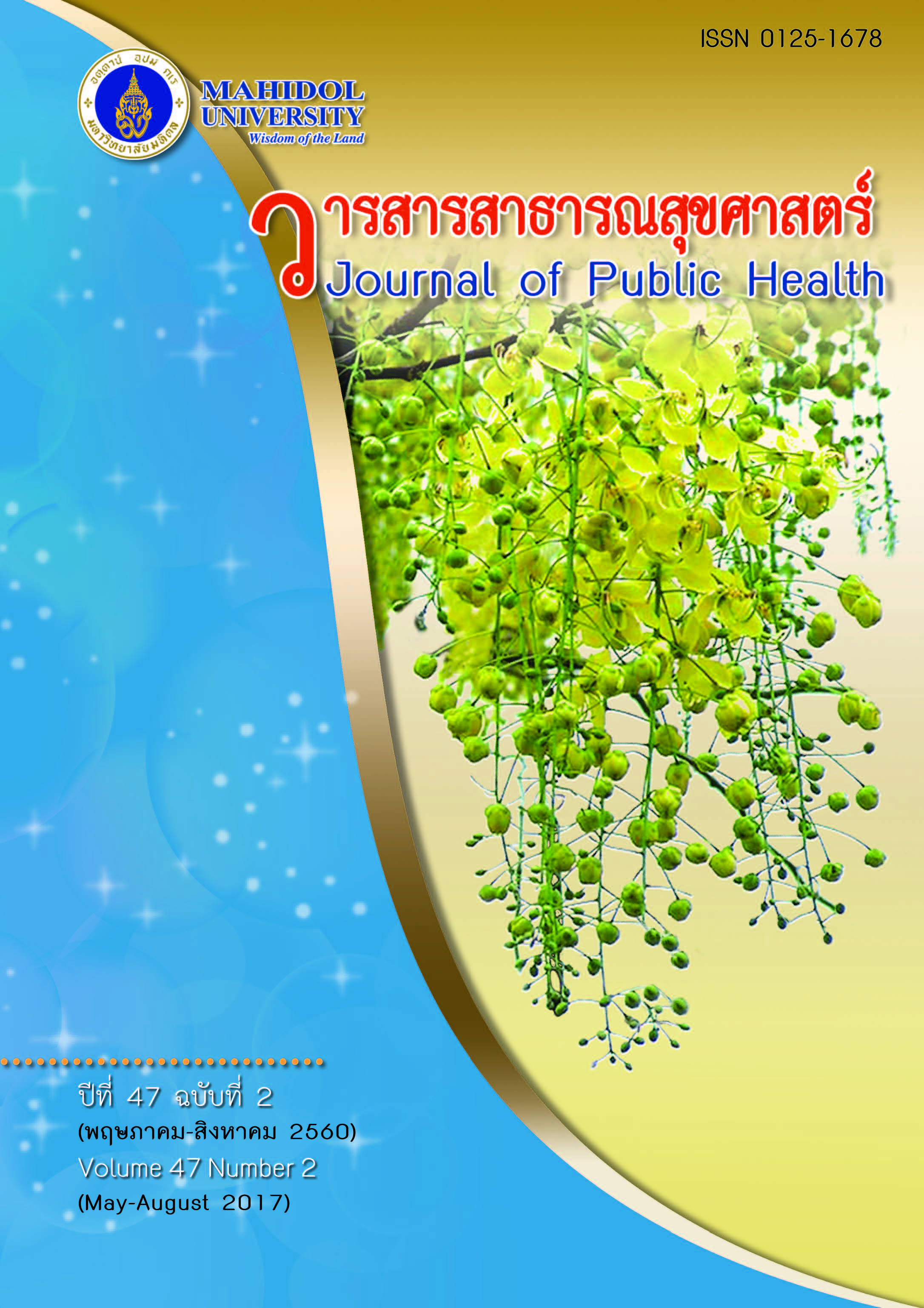โปรแกรมส่งเสริมพฤติกรรมการดูแลตนเองร่วมกับแรงสนับสนุนจากครอบครัวของผู้ป่วยที่ได้รับการรักษาด้วยวิธีการผ่าตัดมดลูกและรังไข่ทั้งสองข้างแบบส่องกล้อง
Keywords:
พฤติกรรมการดูแลตนเอง, แรงสนับสนุนจากครอบครัว, การผ่าตัดมดลูกและรังไข่ทั้งสองข้างแบบส่องกล้อง, self-care behavior, family support, total laparoscopic hysterectomy with bilateral salpingo-oophorectomyAbstract
งานวิจัยกึ่งทดลองนี้มีวัตถุประสงค์เพื่อศึกษาผลของโปรแกรมส่งเสริมพฤติกรรมการดูแลตนเองร่วมกับแรงสนับสนุนจากครอบครัวของผู้ป่วยที่ได้รับการรักษาด้วยวิธีการผ่าตัดมดลูกและรังไข่ทั้งสองข้างแบบส่องกล้อง กลุ่มตัวอย่างคือผู้ป่วยและครอบครัวของผู้ป่วยที่ได้รับการรักษาด้วยวิธีการผ่าตัดมดลูกและรังไข่ทั้งสองข้างแบบส่องกล้อง ณ โรงพยาบาลจุฬาภรณ์แบ่งเป็นกลุ่มทดลองและกลุ่มเปรียบเทียบกลุ่มละ 30 คน กลุ่มทดลองได้รับกิจกรรมโดยมีคู่มือ คำแนะนำก่อนและหลังการผ่าตัดที่ผู้วิจัยได้สร้างขึ้นประกอบในทุกกิจกรรมและการเข้าร่วมกิจกรรมนั้นทั้งผู้ป่วยและครอบครัวต้องเข้าร่วมกิจกรรมพร้อมกันทุกครั้ง กลุ่มเปรียบเทียบได้รับคำแนะนำตามปกติเก็บข้อมูลโดยใช้แบบสอบถามข้อมูลทั่วไปของผู้ป่วยและครอบครัว แบบสอบถามพฤติกรรมการดูแลตนเองของผู้ป่วย แบบสอบถามแรงสนับสนุนจากครอบครัว วิเคราะห์ข้อมูลโดยการแจกแจงความถี่ ร้อยละ ค่าเฉลี่ย ส่วนเบี่ยงเบนมาตรฐาน และการทดสอบค่าที ผลการวิจัยพบว่าก่อนการทดลอง คะแนนพฤติกรรมการดูแลตนเองของผู้ป่วยและแรงสนับสนุนจากครอบครัวไม่แตกต่างกัน (p > 0.05) หลังการทดลองคะแนนพฤติกรรมการดูแลตนเองของผู้ป่วยและแรงสนับสนุนจากครอบครัวสูงกว่าก่อนการทดลอง และสูงกว่ากลุ่มเปรียบเทียบอย่างมีนัยสำคัญทางสถิติ (p< 0.05) ดังนั้นสามารถนำโปรแกรมนี้ไปใช้ และประยุกต์ใช้การส่งเสริมพฤติกรรมการดูแลตนเอง ร่วมกับแรงสนับสนุนจากครอบครัวในการรักษาด้วยวิธีการผ่าตัดวิธีอื่นๆ
Effectiveness of a Self-careBehavior Promotionand Family Support Program inPatients Undergoing Total Laparoscopic Hysterectomy with Bilateral Salpingo-oophorectomy
A quasi-experimental research aimed to examine the application of the promotion of self-care behavior in family support programs among patients undergoing total laparoscopic hysterectomy with bilateral salpingo-oophorectomy (TLH with BSO). Data was collected in Chulabhorn Hospital from 60 patients and their families from October 1, 2015 to May 31, 2016. The patients were assigned in an experimental and a comparative group of 30 participants each. The experimental group participated in self-care behavior promotion and family support program while the comparative group underwent routine pre- and postoperative care. The self-care behavior promotion and family support program consisted of Self-Care Promotion Booklet and family support activities, in which patients and family members participated. Data were analyzed using statistical methods including frequency distribution, percentage, arithmetic mean, standard deviation and T-test. The result showed that before taking part in the program promotion, no significant difference (p >0.05) was observed when comparing the average scores of self-care behavior and family support among both groups. However, after participating, the experimental group showed significant difference concerning self-care behavior and family support scores from the comparative group. The average of self-care behavior and family support scores of the experimental group was significantly higher than those of the comparative group (p <0.05). Self-care behavior with family support is very important. Therefore, to promote self-care behavior, this program could be applied effectively among patients undergoing TLH with BSO. Furthermore, the program could also be applicable to other laparoscopic surgical procedures.
Downloads
Additional Files
Published
Issue
Section
License
Creative Commons License CC-BY-ND


